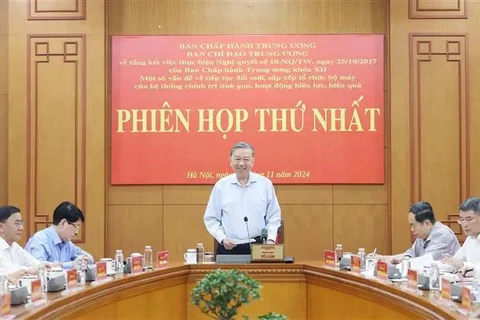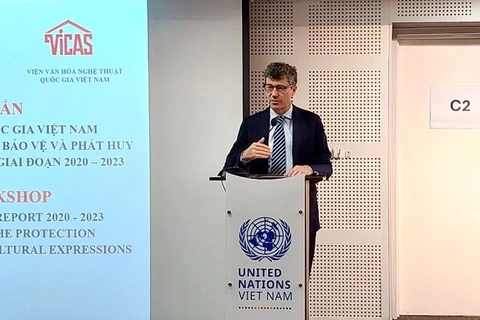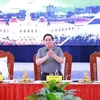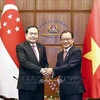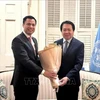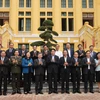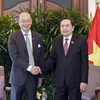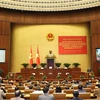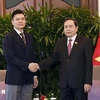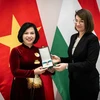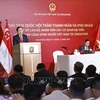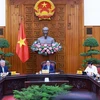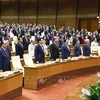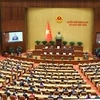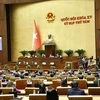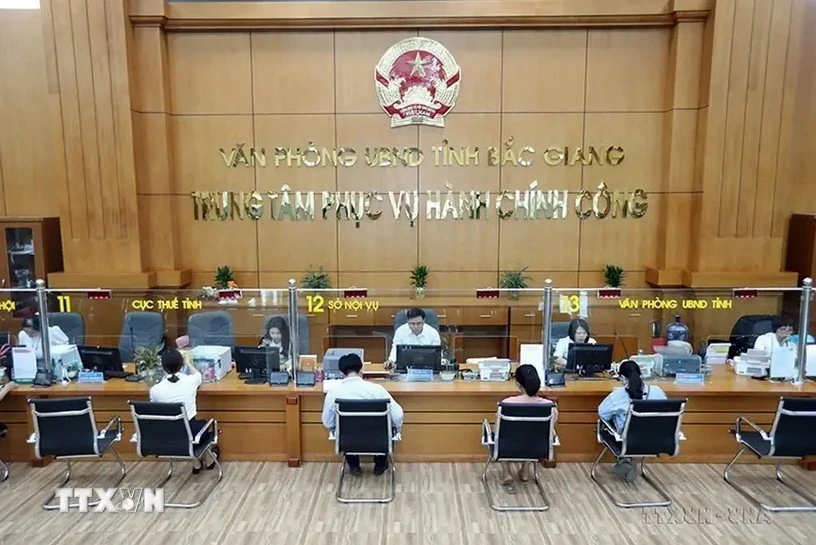
Hanoi (VNA) – The continued reform and restructuring of the political system's organisational apparatus are a critical and urgent task in the current situation as time does not wait, Party General Secretary To Lam stressed while addressing the Party Central Committee’s meeting on November 25.
Time does not wait, as the streamlining of the political system's organisational apparatus is crucial in a new era - the era of the nation’s rise, which, according to the Party chief, begins with the 14th National Party Congress, scheduled for January 2026.
The top priority for this new era is the successful achievement of strategic objectives, including turning Vietnam into a developing country with modern industry and upper-middle income by 2030, and a developed socialist nation with high income by 2045.
Time does not wait, as this urgent task stems from the fact that, to date, the reform and restructuring of the organisational apparatus have not been fully synchronised. The political system remains cumbersome with multiple layers, and the roles, duties, and power of various agencies overlap and lack clarity. There is also insufficient decentralisation and delegation, with low operational effectiveness.
The inefficiency of the state apparatus is one of the key factors contributing to the country’s low labour productivity.
According to the General Statistics Office under the Ministry of Planning and Investment, the labour productivity of Vietnam’s entire economy in 2023 was 199.3 million VND per person (approximately 8,380 USD), an increase of 274 USD compared to 2022, or 3.65% following constant prices. The World Bank (WB) reported that, in terms of purchasing power parity (PPP), Vietnam’s labour productivity grew by an average of 4% per year from 2021 to 2022, ranking second in Southeast Asia, higher than the global average increase at 2%.
However, in absolute terms, Vietnam’s labour productivity in 2022, when measured in USD at PPP, was 2,400 USD, which is equivalent to only 11.4% of Singapore’s, 24.7% of the Republic of Korea’s, 26.3% of Japan’s, 35.4% of Malaysia’s, 64.8% of Thailand’s, 79% of Indonesia’s, and 94.5% of the Philippines’.
Labour productivity is a key indicator of a country’s development level.
The 13th National Party Congress set the target of raising the average national labour productivity to more than 6.5% per year in the 2021-2025 period.
On November 8, 2023, the Prime Minister signed Decision No. 1305/QD-TTg, approving the national programme for labour productivity improvement until 2030, which aims to make labour productivity a key driver of fast and sustainable growth. By 2030, Vietnam aims to rank among the top three ASEAN countries for labour productivity growth.
To this end, the programme gives six key tasks, including restructuring the economy in parallel with renovating the economic model based on science, technology, knowledge, innovation, and high-quality human resources, along with completing the legal framework to create a favourable environment for business development, entrepreneurship, startups and innovation, mobilising and effectively utilising both domestic and international resources to enhance labour productivity, and promoting economic restructuring to boost competitiveness across sectors.
At a forum on enhancing the national labour productivity in May 2024, Prime Minister Pham Minh Chinh stressed that improving labour productivity is both an urgent and long-term strategic task for the entire political system. It is the shortest path for Vietnam to catch up with developed countries in the world and to boost the nation’s growth in a fast and sustainable manner.
Since the 11th National Party Congress in January 2011, the Party has defined human resources development, institutional reforms and infrastructure development as three strategic breakthroughs for the nation’s development in the new period.
The revolution in streamlining the state apparatus, which General Secretary To Lam has recently called for, is closely linked to the strategic breakthroughs in institutional reform and human resources development.
In his article on November 5, 2024, titled "Elite - Streamlined - Strong - Efficient - Valid - Effective" General Secretary To Lam outlined the key tasks: The first is to build and implement a comprehensive organisational model for Vietnam’s political system that meets the demands and tasks of this new revolutionary phase. This includes reviewing the implementation of Resolution No. 18 issued at the 6th meeting of the 12th Central Party Conference, focusing on assessing the achievements, advantages, shortcomings, and proposing further reforms.
He pointed to the need to focus on reviewing the 7-year implementation of Resolution No. 18 titled “Several issues on continuing to innovate and rearrange the organisational apparatus for an elite and streamlined political system with efficient and effective operations”, adopted by the 6th meeting of the 12th Party Central Committee, making serious and comprehensive assessment of the situation, outcomes, strong points, weaknesses, limitations, obstacles, causes, and lessons learned during the implementation, along with giving recommendations for innovation and rearrangement of the political system’s organisational apparatus to the Politburo and the Party Central Committee.
The second major task mentioned by the leader is to focus on perfecting the institutions in a spirit of both "running and queuing" so as to promptly translate the Party's policies into reality. Relevant legal regulations should be reviewed for amendments, supplements or promulgations correctly by regulations, ensuring that the Party's policies are implemented as soon as they are approved by the Party Central Committee.
Specifically, it is necessary to complete laws on the organisation and operations of agencies within the political system in association with the spirit of boosting the decentralisation and delegation of power following the motto of “localities deciding, localities implementing, and localities bearing the responsibilities”, with the Party, Government, and National Assembly strengthening the completion of the institutional framework, playing the assisting role, enhancing inspection, supervision, and maximising administrative reforms which include reducing costs and creating the most favourable conditions for citizens and businesses, he underlined.
The third task is streamlining the organisational structure, combined with restructuring the contingent of officials to ensure they possess necessary quality, capacity, and qualifications for their tasks, with reasonable payroll and standardised job titles. It is necessary to issue regulations on the framework of standards and criteria for officials at all levels, from central to local, and across different types of organisations, so that proactive reviews can be conducted to identify immediate placements, the leader stressed.
A strong reform of recruitment, training, promotion, appointment, rotation, transfer, and assessment of officials should be implemented in a substantive manner, focused on selecting right people based on measurable outcomes, with no “forbidden” zones and no exceptions in the evaluation of officials, General Secretary Lam emphasised, adding that there should also be effective mechanisms for filtering out those who lack the necessary quality, competence, or credibility, while promoting individuals with outstanding abilities.
Time does not wait as the country is fast approaching the 100th anniversary of the Party’s leadership and the 100th founding anniversary of the nation.
Achieving strategic goals not only requires extraordinary efforts and exceptional commitment but also does not allow any delay or slackening, with a revolution to build a truly elite and streamlined political system promptly carried out, the Party leader underscored./.

